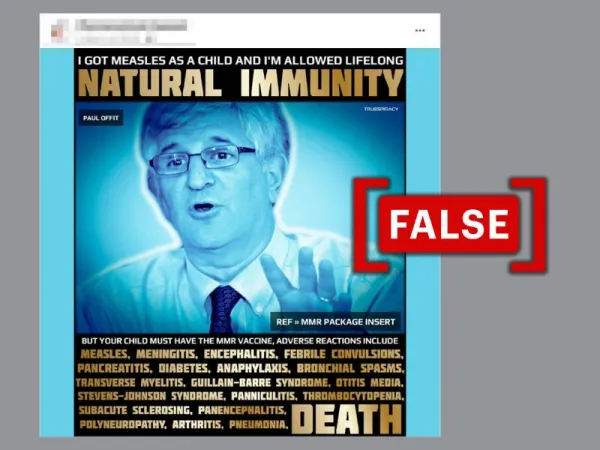By: Iryna Hnatiuk
March 14 2024

Having measles makes a person immune to the disease, but can be incredibly dangerous. The MMR vaccine is safe and results in 99 percent protection.
Context
A claim is circulating on social media that the MMR vaccine is more dangerous than actually getting measles. Vaccines, according to the author of the claim, have many harmful side effects, including meningitis, encephalitis, and death. Having measles, on the other hand, gives a person lifelong immunity.
The claim is false. While having measles once makes a person immune to the disease, it can be very dangerous. The MMR vaccine, on the other hand, is safe and efficient and results in 99 percent protection.
In fact
Measles is an acute viral respiratory illness. It's not only a rash and a runny nose; common complications of measles include middle-ear infection, bronchopneumonia, croup, and diarrhea. One out of every 1,000 measles patients develops acute encephalitis, and one to three out of every 1,000 children who become infected with measles will die from respiratory and neurologic complications.
Aside from death, one of the most severe consequences of measles is subacute sclerosing panencephalitis — a progressive neurological disorder of children and young adults that affects the central nervous system (CNS). It generally develops 7–10 years after measles infection. According to the WHO, measles killed an average of 2.6 million people each year before a vaccine was developed.
The Centers for Disease Control and Prevention (CDC) states that the measles, mumps, and rubella (MMR) vaccine is safe and effective. Getting two doses gives a person 99 percent protection and provides lifelong immunity. Like any medicine, the MMR vaccine has some side effects. For example, about 1 in 6 children develop a fever 7 to 12 days after immunization, and about 1 in 3,000 develop febrile seizures. These side effects, most of which are benign, are acknowledged by members of the medical profession.
Johns Hopkins infectious disease experts Aaron Milstone, M.D., M.H.S., and Lisa Maragakis, M.D., M.P.H., confirmed to Logically Facts that "the measles vaccine is extremely safe. Some children — about 10 percent — will develop a fever about six to 12 days after vaccination, and an even smaller percentage will have a rash that can last a few hours to a day or two. In sporadic cases, the fever can precipitate a seizure in children predisposed to fever-induced seizures. Scientific research has shown that the measles vaccine does not cause permanent neurologic or developmental problems."
Using the name and the photo of Dr. Paul Offit, a pediatrician specializing in virology and immunology at Children's Hospital of Philadelphia, in this publication is misleading. The caption on the image cannot be attributed to him, and Dr. Offit did not make such a statement. On the contrary, in his conversation with PBS, he stated that "before there was a measles vaccine in 1963, every year in the U.S., there would be three to four million measles cases. There would be 48,000 people hospitalized, mostly children less than 15 years of age, and there'd be 500 people who died, again, mostly children.
When they died, they died from severe dehydration or severe pneumonia or encephalitis, which is inflammation of the brain. It is a terrible disease."
Conclusion:
MMR inoculation is much safer than contracting measles, mumps, or rubella. The side effects of the vaccine are insignificant and can pass quickly, while getting measles can lead to dangerous consequences. The only effective way to prevent measles and build herd immunity is vaccination.